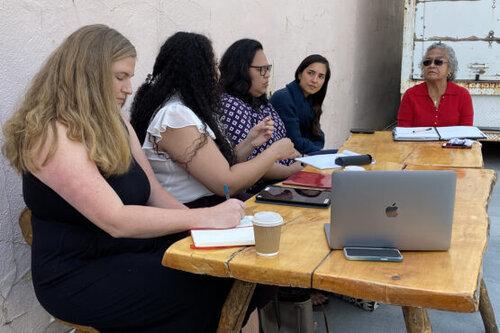A New Effort to Help Communities Adapt to Climate Change (PBS NewsHour)

The $1 trillion bipartisan infrastructure bill passed last month in the United States includes $50 billion to mitigate and adapt to the effects of global warming. PBS NewsHour Special Correspondent Tom Casciato reports on a Bay Area partnership that uses behavioral science and cultural awareness to help communities respond to extreme weather. The story shows Ortensia Lopez of El Concilio in San Mateo, Violet Wulf-Saena of Climate Resilient Communities, and Stanford researchers Gabrielle Wong-Parodi, Stephanie Fischer, and Natalie Herbert planning to use smart phone technology and in-person surveys to understand how communities experience climate hazards—like heavy smoke from wildfires—and identify practical solutions. The Our Communities, Our Bay partnership has support from Stanford Impact Labs' start-up impact lab funding.
From the story:
Tom Casciato (PBS NewsHour): Wulf-Saena's work involves helping low-income Californians to adapt, and the need for that is acute. One example: climate-change-fueled wildfires are becoming the new normal in California, where so far this year over eight thousand fires have burned some 2.5 million acres. The smoke, migrating hundreds of miles, can most harm the health of people who can't afford to weatherize their homes.
Violet Wulf-Saena (Climate Resilient Communities): You know, construction-wise, of course, the smoke, the smoky air can enter the home easily. And a lot of them didn't know what to do that will keep them safe.
Tom Casciato (PBS NewsHour): Finding solutions to keep the most vulnerable safe, and building a bridge connecting climate science to those most harmed by climate change is the mission of Stanford University professor and behavioral scientist Gabrielle Wong-Parodi.
Gabrielle Wong-Parodi (Stanford): I do not think that climate science and the public need to kind of stay over here in their — on their — on their own sides. I think we can study the change all we want but we may identify the perfect solutions, but they may fail in the real world. And so we have to engage with people. We have to engage with all people.
Tom Casciato (PBS NewsHour): That's the rub — not only helping people adapt but figuring out how. She's begun a study of low-income areas to assess the ways technology and communication can help with the sometimes harrowing health risks people face in a smokey home.
Watch the full PBS NewsHour story and read the transcript.
